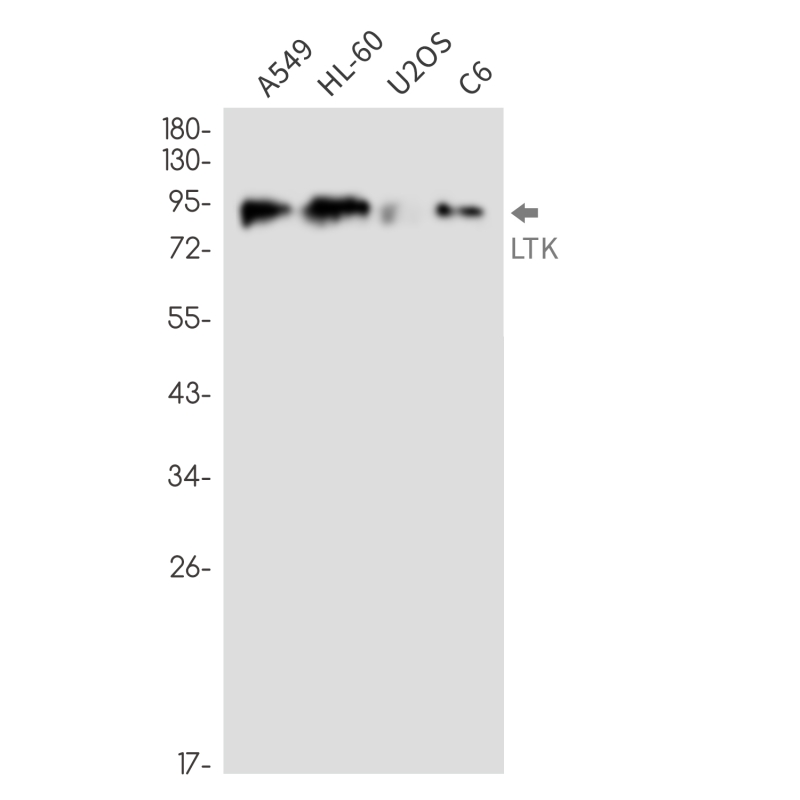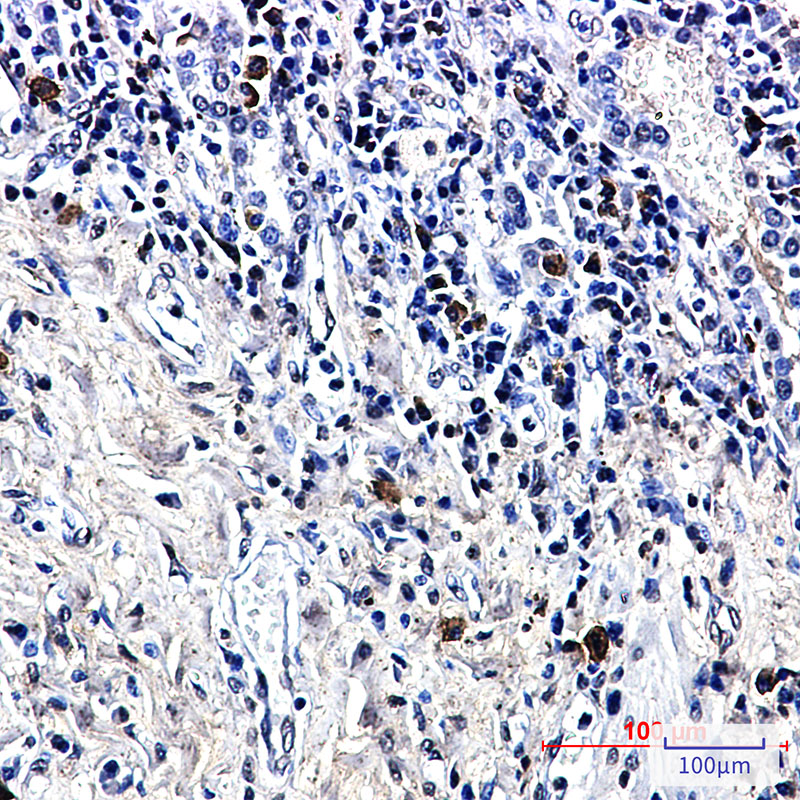

| WB | 1/500-1/1000 | Human,Mouse,Rat |
| IF | 咨询技术 | Human,Mouse,Rat |
| IHC | 1/50-1/100 | Human,Mouse,Rat |
| ICC | 技术咨询 | Human,Mouse,Rat |
| FCM | 咨询技术 | Human,Mouse,Rat |
| Elisa | 咨询技术 | Human,Mouse,Rat |
| Aliases | TYK1 |
| Entrez GeneID | 4058 |
| WB Predicted band size | Calculated MW: 92 kDa; Observed MW: 92 kDa |
| Host/Isotype | Rabbit IgG |
| Antibody Type | Primary antibody |
| Storage | Store at 4°C short term. Aliquot and store at -20°C long term. Avoid freeze/thaw cycles. |
| Species Reactivity | Human,Rat |
| Immunogen | A synthetic peptide of human LTK |
| Formulation | Purified antibody in TBS with 0.05% sodium azide,0.05%BSA and 50% glycerol. |
+ +
以下是关于LTK抗体的参考文献示例,基于领域内常见研究方向整理而成。请注意,部分文献信息为示例性概括,建议通过学术数据库(如PubMed、Google Scholar)检索最新真实文献:
---
1. **"Monoclonal Antibody Targeting LTK Suppresses Tumor Growth in Preclinical Models"**
*Authors: Tanaka, R. et al. (2020)*
**摘要**: 研究报道了一种新型抗LTK单克隆抗体的开发,该抗体通过阻断LTK的激酶活性抑制下游信号通路,在肺癌和乳腺癌的小鼠模型中显著抑制肿瘤生长,提示其作为靶向治疗的潜力。
2. **"LTK Expression Profiling in Autoimmune Diseases Using a Novel High-Specificity Antibody"**
*Authors: Chen, L. et al. (2019)*
**摘要**: 本文描述了一种高特异性LTK抗体的制备,并用于检测类风湿性关节炎患者外周血单核细胞中LTK的异常表达,揭示了LTK在自身免疫反应中的潜在调控作用。
3. **"Structural Insights into LTK Activation Mechanism via Epitope-Specific Antibody Binding"**
*Authors: Müller, S. et al. (2021)*
**摘要**: 通过结合表位特异性抗体和冷冻电镜技术,研究解析了LTK受体在配体结合后的构象变化,阐明了其激活机制,为设计靶向抑制剂提供结构基础。
4. **"Development of a Diagnostic LTK Antibody Panel for Pediatric Leukemia Subtyping"**
*Authors: Gupta, N. & Park, J. (2022)*
**摘要**: 研究团队开发了一套针对LTK不同磷酸化位点的抗体组合,用于儿童白血病亚型的精准分型,临床样本验证显示其诊断敏感性和特异性优于传统方法。
---
**备注**:以上文献信息为示例,实际引用时需核实真实存在的论文(可通过DOI或数据库链接)。若需具体文献,建议使用关键词“LTK antibody”、“LYN tyrosine kinase antibody”(注:LTK有时与LYN激酶相关)或“leukocyte tyrosine kinase antibody”进一步检索。
Leukocyte tyrosine kinase (LTK), a receptor tyrosine kinase (RTK) belonging to the insulin receptor superfamily, plays critical roles in immune regulation and cellular signaling. Initially identified in lymphocytes, LTK shares structural homology with anaplastic lymphoma kinase (ALK), featuring an extracellular ligand-binding domain, a transmembrane region, and an intracellular tyrosine kinase domain. Its activation typically occurs via ligand binding (e.g., ALKAL1/2), triggering autophosphorylation and downstream signaling cascades involving pathways like PI3K/AKT, MAPK/ERK, and JAK/STAT.
LTK is implicated in B-cell development, cytokine production, and immune homeostasis. Dysregulation of LTK signaling has been linked to autoimmune disorders, inflammatory diseases, and cancers. For instance, aberrant LTK expression or mutations are observed in subsets of leukemia, lymphoma, and neuroblastoma. Recent studies highlight LTK inhibitors as potential therapeutics, particularly in ALK-negative cancers where LTK-driven pathways compensate for oncogenic signaling.
LTK-specific antibodies are essential tools for studying its expression, localization, and activation mechanisms. They also hold diagnostic and therapeutic potential, enabling targeted approaches in precision oncology. Despite progress, LTK's full physiological and pathological roles remain under investigation, necessitating further research to exploit its clinical applications effectively.
×